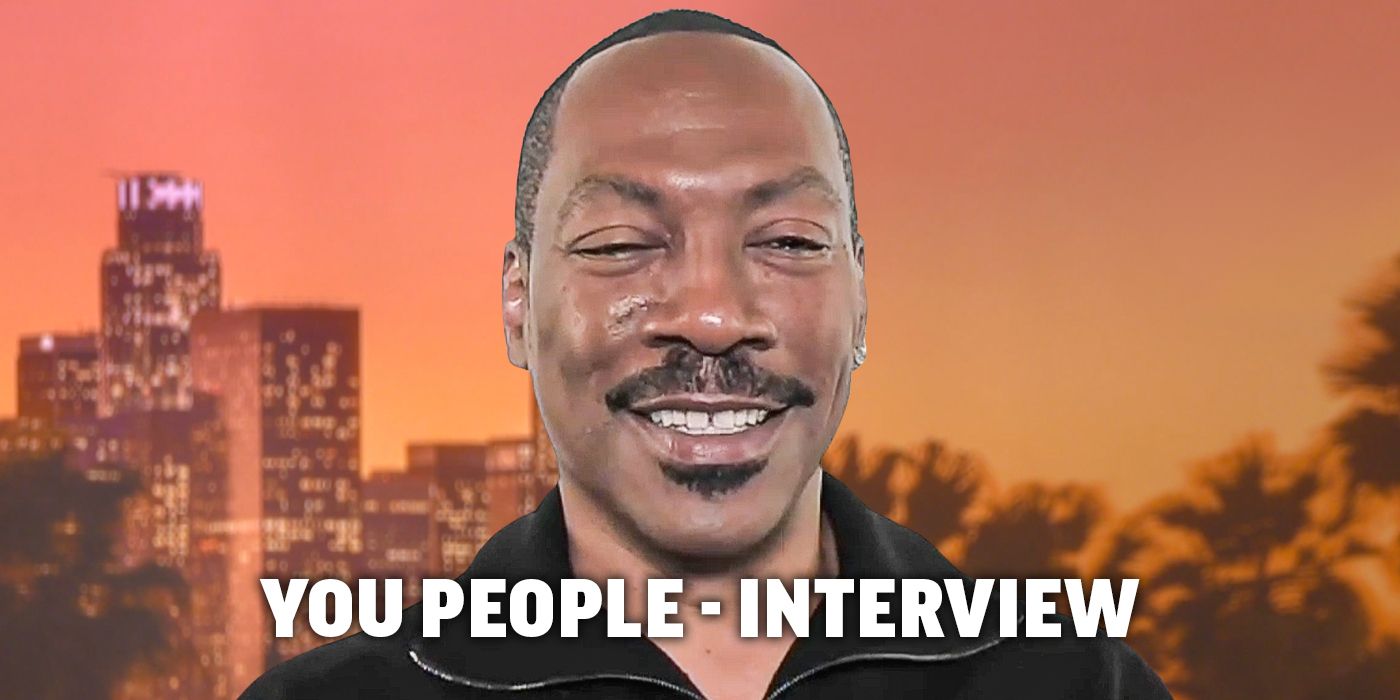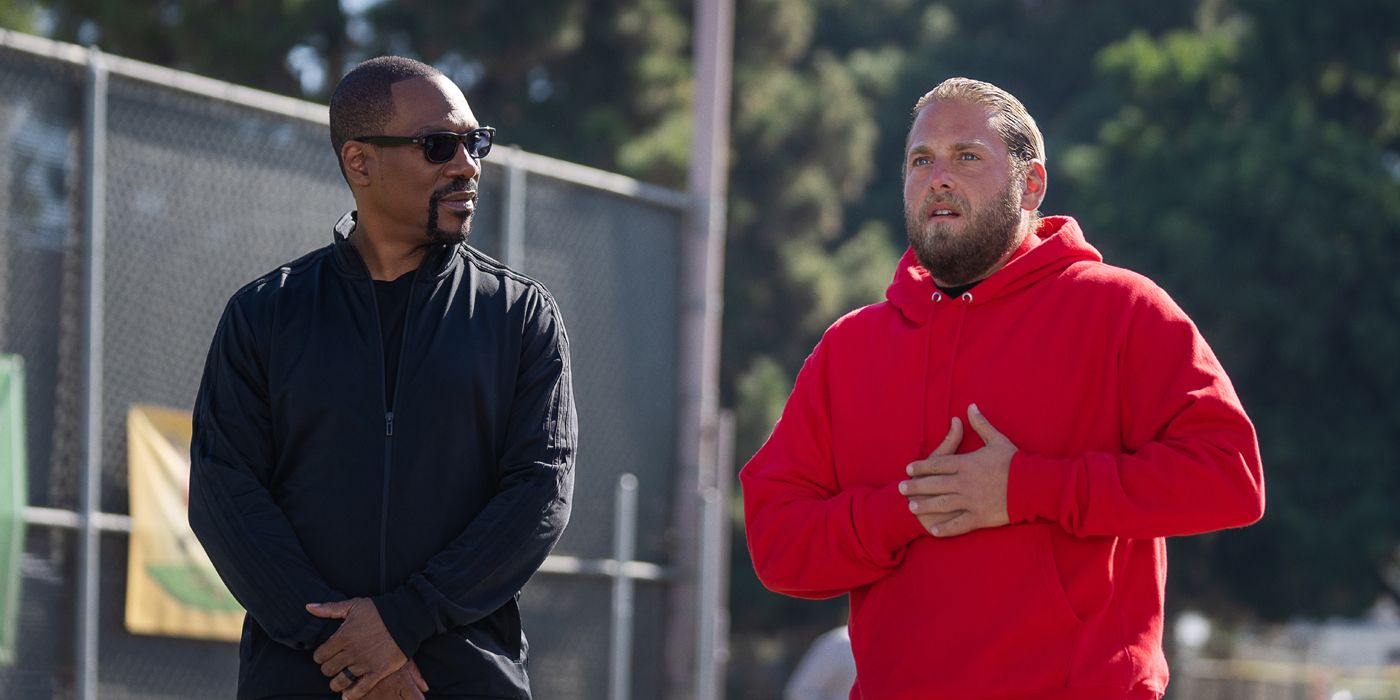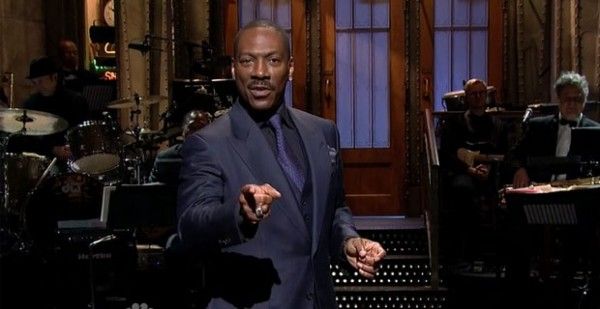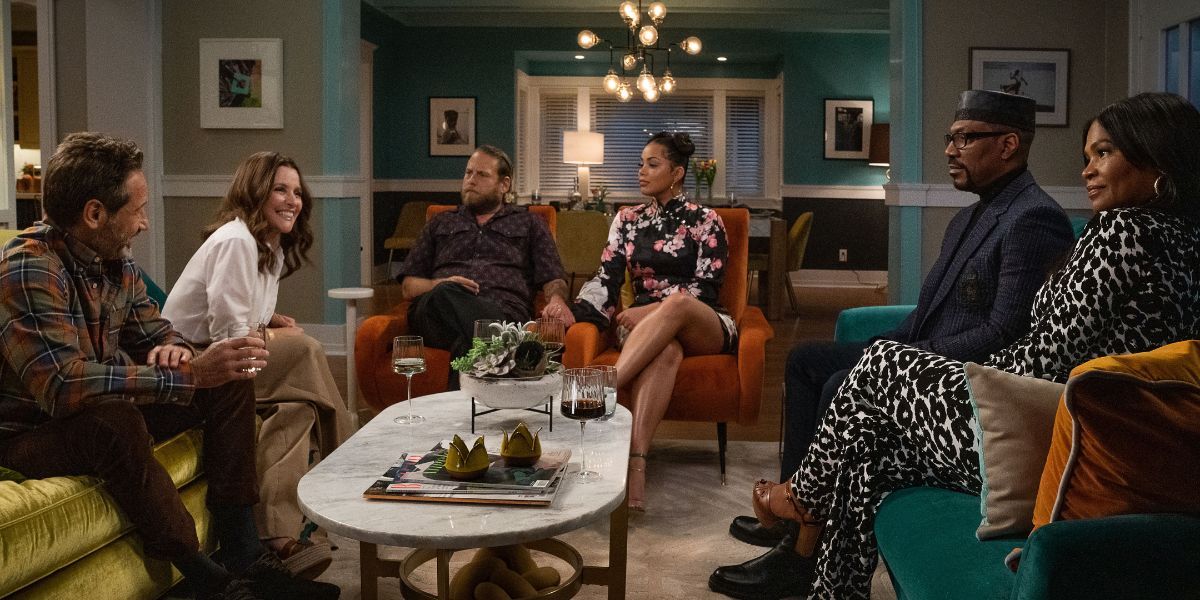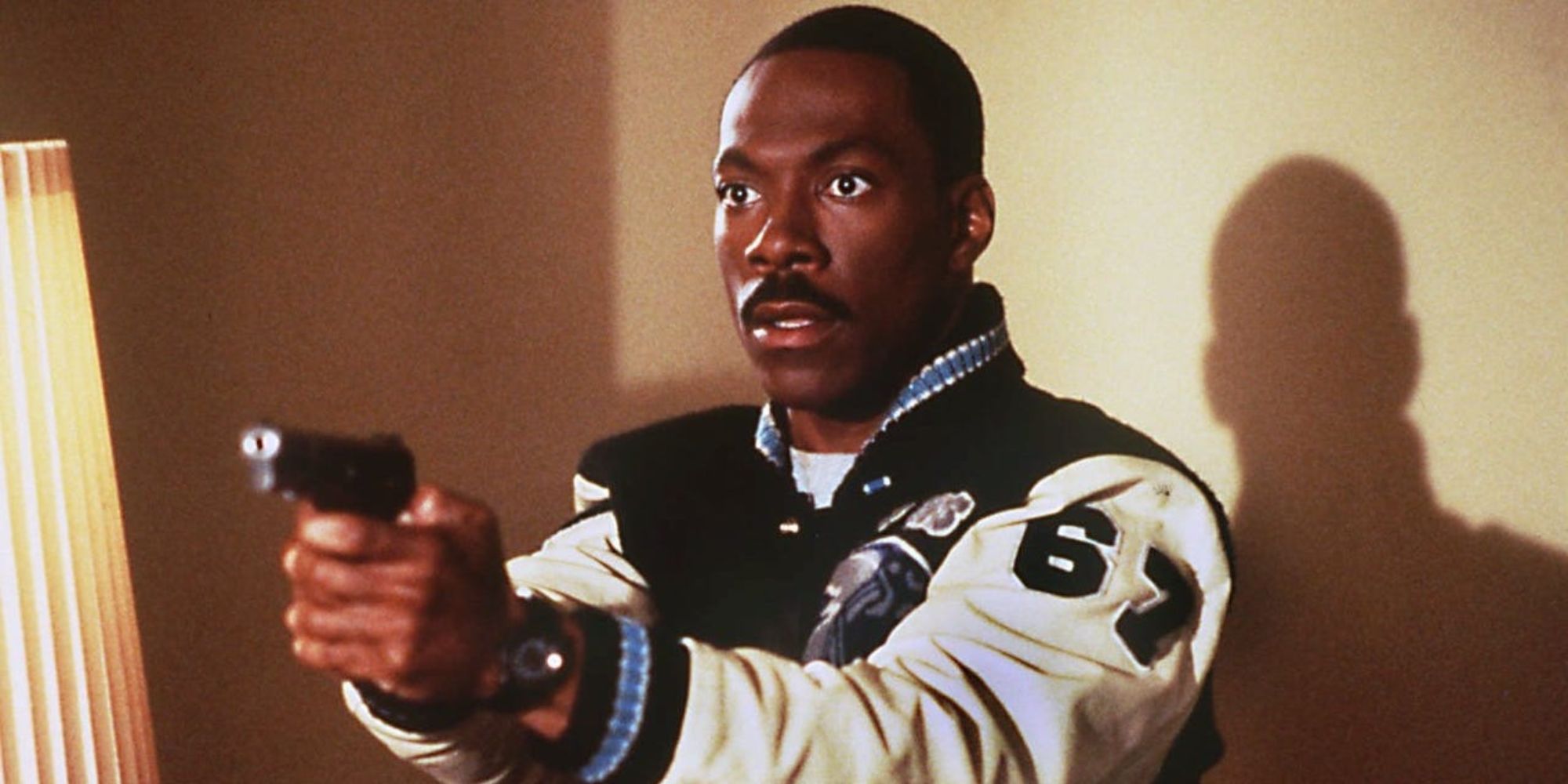In Kenya Barris’ (Black-ish) feature directorial debut, You People, Jonah Hill, who co-wrote for the film, plays Ezra Cohen, a man desperate for love. When Ezra accidentally mistakes Amira Mohammad (played by Lauren London) for his Uber driver, the two laugh off the meet-cute and find that they really are falling for one another. In typical rom-com fashion, they have a happy, healthy relationship that Ezra is excited to take to the next level, but this means they'll have to meet each other's families.
In a new take on the romantic comedy, You People addresses a number of important topics such as cultural and generational differences, and societal expectations that threaten the couple's bond. Featuring an all-star cast, Ezra and Amira must appeal to each other’s families for their respect and blessing, and it isn’t going to be easy. In addition to Hill and London, the cast includes Nia Long, Julia Louis-Dreyfus, David Duchovny, and Academy Award-nominee Eddie Murphy, who plays Amira’s hesitant and skeptical father, Akbar. He isn't thrilled by Ezra, but it's when he and his wife, Fatima (played by Long), meet with Ezra's parents, Shelley (Dreyfus) and Arnold (Duchovny), that the culture clashing really heats up.
Ahead of the movie’s Netflix release, Collider’s Steve Weintraub spoke with Murphy about his role in the film. During the interview, Murphy discusses what it was about You People that drew him to the project, why it was fun to work with Jonah Hill, and what it was like being a part of Kenya Barris’ first-ever feature-length production. He also shares his first time meeting Rodney Dangerfield, an update on his documentary The Last Stand, and tells us why he finally agreed to make another Beverly Hills Cop. You can watch the interview in the player above, or read the full transcript below.
EDDIE MURPHY: You want to hear the great Rodney story?
Oh, 100% I do.
MURPHY: So I met Rodney Dangerfield. I'm 16, 17 years old and I'm getting ready to go up on stage, and Rodney comes and he bumps me and he goes, "Hey, you can't go up. Rodney's going on." So Rodney goes on and he kills, and I'm like, “I'm going to go up after Rodney.” And so no one to wanted to go up, so I went up after him and I do my stuff, and afterward, Rodney is like, "Hey kid, where are you going to go with all of that stuff, all that cursing and using that language…?” Basically told me I wasn't shit. So I was like, “Oh.” I was crestfallen. My mind was blown. And I was like, “Rodney didn't like me. He thought I was too dirty.”
And long story short, maybe two, three years later, I blew up and I'd become Eddie Hotshot, and I was in the bathroom of Caesar's Palace going at the urinal, and Dangerfield comes and stands right next to me. I look over and he looks and says, "Hey, who knew? Who knew?" But yeah, now we can do the interview. What were you saying?
First of all, that's awesome. But the thing I love about Rodney is he said the same jokes again and again over the course of 10 years. I ate up every single one of them. He could say the same thing.
MURPHY: Because it's the character. It's the character and the delivery. You'll laugh every time you see it. If you watch Archie Bunker, if you watched Sanford and Son, and they made you laugh every time you watched that episode, it'll make you laugh. It's the character.
I just want to say, again every time I've been lucky enough to speak with you. I am a huge fan and I really want to say a sincere thank you for all of your work over the years, and for making the entire planet laugh.
MURPHY : Oh God bless you. Thank you, brother.
I sincerely thank you. So I spoke to John Davis and John Fox not too long ago, and they told me they were working on a documentary with you.
MURPHY: Yeah. They've been doing that documentary for... They started that when I went back to host Saturday Night Live. So what's that? Three years ago, four years.
It's been a while. And I'm curious, what was it about this doc that you said, "I'm going to allow myself to be filmed and I want to tell my story?”
MURPHY: Well, I have been doing it so long, and there wasn't anything like that, and I've had a unique career. So I was like, “Everybody does documentaries now.” I've been doing it long enough, and there's enough stuff that there's an interesting story there, how it all happened, and it's all documented.
And my last thing on it, is there an endpoint that you see where you're going to stop filming?
MURPHY: The end was... Because we had probably ended, maybe, three or four months ago, then was like, “Hey, I'm going to get this Cecil B. DeMille Award. That's a good way to end it.” So the end will be that, winning that, getting that award.
I am very much looking forward to seeing this. Jumping into why I get to talk to you. You've said to me in the past that you enjoy sitting on your couch, being with your kids, and are selective with what you want to do. So what was it about this project that said, “I'm going to get off the couch and I'm going to go make this?”
MURPHY: Well I had been on the couch for 10 years, and it was like, “Okay, I want to do something.” My batteries had recharged, and I forgot about why I went to the couch in the first place. What happened in the first place was that it got to where I just wasn't having fun making movies. It was like, “Okay, I don't want to be up here just making movies I'm not having fun making,” and you’re just doing it because they offer you a lot of money. Because you could see that. You could see that when you go see those movies. You'll see it, be like, “What the fuck is this movie?” It's like, “Oh, the artist must have just got a big check for it.” And I didn't want to do any more movies like that. So, once my batteries got recharged, and I wanted to work again, I got off the couch. And then I wanted to do different, interesting things.
I'm a huge fan of [Jonah Hill’s] work. I'm a huge fan of your work, and you both make me laugh so much. There's some great stuff between the two of you, especially when you're driving together. And I'm just curious, what was it like collaborating with someone like Jonah who is also very good on his feet, very good with improv?
MURPHY: [Jonah] was so much fun to work with because most actors can't do that. Most actors, they do the stuff that’s on the script, and if you go off script, or you start playing around… I've been in scenes where actors just be looking at you. You'd go all over the place and they're just kind of looking at you, and [they] say, “Cut.” And they say, “Oh, I was watching.” They start watching you.
But Jonah, if you go off script, he's right there with you, and sometimes he'll go, or you got to come with him, and he's funny and smart. It was fun working with him.
I really enjoyed what (diretor) Kenya [Barris] did with the editing in between the scenes, and it just felt like he did a really great job with the material. Can you talk about what he was like because this was his first feature? What was it like actually collaborating with him, and finding different things in the moment?
MURPHY: It was easy. We had not one awkward moment. He's super smart, and super talented, and being a showrunner – he's been the showrunner on Black-ish, he's done that – being a showrunner is as close as you can get to the director's experience where you're in charge of everything, and every decision, and all that. So he's worked with actors, and worked with technical people, and had to do that dance. So it was cool, it was real easygoing.
Sneaker culture plays a part of this film, and I don't believe you get to wear any... I don't remember seeing you wear any cool sneakers. Was that something that you wanted for your character, or did you take any from set? Because there's a lot of cool stuff in this movie.
MURPHY: Well, sneaker culture is... My character wouldn't be a part of the sneaker culture. My generation, the sneaker culture hadn't jumped off yet. That happened when I was grown. When I was a kid, there was really no sneaker culture. You had a pair of Chuck Taylor Converse or some Pumas, or that was it. Some Pumas or some Chuck Taylors. If they weren't Pumas or Chuck Taylors, they called them skips. You had on some skips.
My last thing for you. I am so looking forward to the new Beverly Hills Cop because you're in it, and I know that it has to be good if you're coming back to this role. What was it that finally said, “I'm going to make another one?” What finally got you to do it?
MURPHY: Jerry Bruckheimer, the original producer. When he got involved, and he started developing the script, and he knew what Beverly Hills Cop was supposed to be. When he got back involved, that's when it all started to come together. Because we tried for years and years, maybe 10, 12 years, and I must have read five or six different scripts, and it was never right. And the studio was like, "Let's go. Here it is." It was like, “It’s just not it.”
Jerry Bruckheimer got back in there, and he knows his shit, and he put it together. He did [Top Gun: Maverick] just last year, and The Bad Boys is Jerry Bruckheimer. So we have that same brain behind Beverly Hills Cop, and he put all the pieces in place that were required for us to make a great movie. And I'm excited for people to see it. It's really hard to make though.
Because?
MURPHY: Because Axel Foley is 21, and I'm not 21. I'm not 21. It was a long time ago, and it's a really physical movie. And then I had to do some physical stuff. I know Tom Cruise likes to do physical stuff, but yeah, you started off the interview by, I like to be on the couch. I don't like to be jumping over, and shooting, and running, and I had to do some jumping and shooting and running, and as a result, had a knee brace at the end of the movie. I had a knee brace, and my back is messed up,and all that. But the movie is going to be special.
You People begins streaming on Netflix January 27. For more on the movie, check out our interview with director Kenya Barris and actress Lauren London below:

